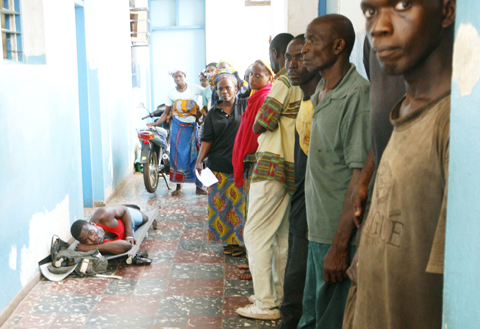Police fired on demonstrators at an anti-government rally on Friday, killing five people and wounding a dozen in Ivory Coast’s latest protest since the president dissolved the government a week ago, the opposition said.
Demonstrations spread to at least eight cities in the West African nation on Friday.
Moussa Dembele of the opposition RDR party said the deadly protest took place in Gagnoa, about 200km northwest of the economic capital, Abidjan.

PHOTO: REUTERS
Ivorian President Laurent Gbagbo had set a Friday deadline to form a new government, but the prime minister on Thursday evening asked for a 48-hour extension.
Dembele said late on Wednesday that the death toll had increased to five people from three earlier in the day.
“The police were aiming directly at the protesters,” he said. “These weren’t stray bullets.”
Augustin Gehoum, a spokesman for Gbagbo’s party, said the deaths were “regrettable,” but that police were not to blame.
He also said the protests were part of an opposition strategy to destabilize the country after Gbagbo’s decision to dissolve the government.
“Now they are crying ‘dictatorship,’” he said. “It’s nothing of the sort. Mr Gbagbo dissolved a body that had lost the confidence of the Ivorian people.”
The dissolution of the government has thrown into doubt the political reconciliation process in Ivory Coast, which was about to hold elections.
Five years after the president’s term ended, Ivory Coast has yet to hold a ballot to replace him.
The now-defunct government was the fruit of a peace deal signed by Gbagbo’s government and the New Forces rebels in 2007 following a civil war that split the world’s No. 1 cocoa producer into a rebel-held north and a government-controlled south.
The unity government was composed of 33 ministers from all political parties as well as from rebel factions.
At the heart of the impasse that has delayed elections for five years is the question of who is really Ivorian. Before its brief civil war, Ivory Coast was one of Africa’s economic stars, boasting a modern, cosmopolitan capital that lured tens of thousands of immigrants from poorer neighboring nations.
At least a quarter of the nation’s 20 million people have been disqualified from voting based on the electoral law’s convoluted definition for determining eligibility, stoking tension.
UN Secretary-General Ban Ki-moon expressed “grave concern” at the Ivorian political situation, UN deputy spokeswoman Marie Okabe said.
“The secretary-general is concerned about the clashes that occurred today in Gagnoa, which resulted in a number of deaths and injured people and are a reminder of the volatility of the situation,” Okabe said.
“The secretary-general urges the Ivorian people to remain calm and the Ivorian political actors, authorities and the media to refrain from any action and rhetoric that could result in more violence,” she said.

Nauru has started selling passports to fund climate action, but is so far struggling to attract new citizens to the low-lying, largely barren island in the Pacific Ocean. Nauru, one of the world’s smallest nations, has a novel plan to fund its fight against climate change by selling so-called “Golden Passports.” Selling for US$105,000 each, Nauru plans to drum up more than US$5 million in the first year of the “climate resilience citizenship” program. Almost six months after the scheme opened in February, Nauru has so far approved just six applications — covering two families and four individuals. Despite the slow start —

YELLOW SHIRTS: Many protesters were associated with pro-royalist groups that had previously supported the ouster of Paetongtarn’s father, Thaksin, in 2006 Protesters rallied on Saturday in the Thai capital to demand the resignation of court-suspended Thai Prime Minister Paetongtarn Shinawatra and in support of the armed forces following a violent border dispute with Cambodia that killed more than three dozen people and displaced more than 260,000. Gathered at Bangkok’s Victory Monument despite soaring temperatures, many sang patriotic songs and listened to speeches denouncing Paetongtarn and her father, former Thai prime minister Thaksin Shinawatra, and voiced their backing of the country’s army, which has always retained substantial power in the Southeast Asian country. Police said there were about 2,000 protesters by mid-afternoon, although

MOGAMI-CLASS FRIGATES: The deal is a ‘big step toward elevating national security cooperation with Australia, which is our special strategic partner,’ a Japanese official said Australia is to upgrade its navy with 11 Mogami-class frigates built by Japan’s Mitsubishi Heavy Industries, Australian Minister for Defence Richard Marles said yesterday. Billed as Japan’s biggest defense export deal since World War II, Australia is to pay US$6 billion over the next 10 years to acquire the fleet of stealth frigates. Australia is in the midst of a major military restructure, bolstering its navy with long-range firepower in an effort to deter China. It is striving to expand its fleet of major warships from 11 to 26 over the next decade. “This is clearly the biggest defense-industry agreement that has ever

DEADLY TASTE TEST: Erin Patterson tried to kill her estranged husband three times, police said in one of the major claims not heard during her initial trial Australia’s recently convicted mushroom murderer also tried to poison her husband with bolognese pasta and chicken korma curry, according to testimony aired yesterday after a suppression order lapsed. Home cook Erin Patterson was found guilty last month of murdering her husband’s parents and elderly aunt in 2023, lacing their beef Wellington lunch with lethal death cap mushrooms. A series of potentially damning allegations about Patterson’s behavior in the lead-up to the meal were withheld from the jury to give the mother-of-two a fair trial. Supreme Court Justice Christopher Beale yesterday rejected an application to keep these allegations secret. Patterson tried to kill her